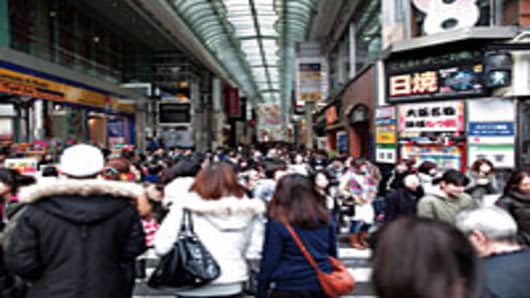Just four months after a vicious earthquake and tsunami devastated its mainland, Japan suddenly is being looked at as an enticing investment opportunity.
Though still slightly negative for the year, the Japanese stock market has outperformed most if not all other developed markets over the past two months.
Investors have been raining money into Japan-centric exchange-traded funds, and even the normally weak yen is attracting interest as the US and Europe suffer under the weight of burdensome debt crises.
Some are calling the Japanese story "the war effect" where a ravaged country uses tragedy as an opportunity to rebuild, while others believe the story merely comes down to a nation benefiting from the weakness of others.
"There are just so many systemic headwinds in the major developed countries," says Mark McCormick, currency strategist at Brown Brothers Harriman. "What we're going to see in the second half of the year is a V-shaped recovery in Japan, led by the vehicle production sector."
Back in March that seemed a near impossibility, after the quake and ensuing tidal wave wreaked devastation on the Japanese coastal areasand at the heart of its industrial base.
While panic spread through the globe that a deeper Japanese slowdown could jeopardize the broader global economic recovery story, the nation went to work rebuilding and investors rather quickly headed back.
Since the March 15 panic low, the Japanese Nikkei stock market is up nearly 17 percent and about 7.5 percent just since June 17.
Over the past five weeks, Japanese ETFs have posted a whopping $842 million in inflows, while Japanese stock-based mutual funds have recorded inflows for four straight weeks, the biggest streak of the year, according to data from TrimTabs Investment Research.
Experts on Japan compare the situation to New Zealand, which suffered a brutal earthquake in Christchurch a month earlier and also is rebuilding.
"It's basically the war effect," says Todd Horwitz, chief strategist for the Adam Mesh Trading Group in New York. "Bad times brought on the wars and wars brought on good times because of all the things you need to do to recover, to get people back to work."
A Japanese recovery would help the US at least at the margins, with construction-related companies such as Deere and Caterpillar benefiting from the need for materials and resources, Horwitz says.
Uranium companies, such as Cameco and Uranium Energy, would be helped by the rebuild of the nuclear industry, while uranium ETFs such as the Global X Uranium fund also could gain, he says.
"It's highly possible that Japan becomes the fastest-growing G7 economy in the second half of this year."
At the same time, currency traders are closely watching moves in the yen as the Japanese currency could get a boost by aversion to the US dollar and the euro.
The yen has fallen about 3.5 percent against the dollar over the past three weeks or so and is ready to test a resistance point of 77.50, according to Michael Boutros, currency analyst at DailyFX Research.
"Any type of intervention (from the Bank of Japan) might be a good opportunity to fade the rally for intraday traders," Boutros advises.
But the yen could hold as its competing currencies continue to get trashed by debt worries.
"The New Zealand dollar got hit hard (after the Christchurch earthquake) but since then there's been an almost 'V'-shaped recovery. We'll see the same thing in Japan," says Marc Chandler, global head of currency strategy, also at Brown Brothers Harriman. "It's highly possible that Japan becomes the fastest-growing G7 economy in the second half of this year."
The iShares MSCI Japan Industrial Fund ETF was the third-biggest gainer in fund flows among all ETFs over the past week, suggesting that many investors concur.
One of the advantages Japan provides is diversification as most of the world's economies and markets seem to rise and fall in tandem as the global debt dangers spread. Japan could be less correlated to other markets as it does not have the same issues.
"It's sort of like a stock that's been absolutely pounded into the ground. Investors will look at it and say, 'I believe in the story longer term. No matter what happens it's so beaten down, so what else can happen?'" says Nicholas Colas, chief market strategist at CovergEx. "It's not correlated to the global economy."
Colas believes the Japanese recovery is sustainable.
"They will find a way to dig themselves out literally and figuratively," he says. "It's just going to take a long time because their political system is every bit as fragile as ours."
While it's difficult to gauge what impact a Japanese recovery likely to come in fits and starts will have on the global economy, at least one strategist sees a positive impact on emerging markets.
Developing countries like Brazil, Russia, India and China—the BRICs—had fallen out of favor with investors earlier in the year but are getting renewed interest now that inflation in those nations seems tamed for now.
Emerging market ETFs have turned positive over the past month (thought experiencing a slight outflow last week) and investors have become especially hungry for emerging market bond ETFs, which have taken in $1.7 billion in 2011.
Japan's struggle to recover from the tsunami devastation should only help developing countries in the Asian region, says Peter Lee, head of emerging markets investment strategy at Mirae Asset Global Investment, a New York-based firm that manages $60 billion in assets.
"Japan's economy recovering means that many Japanese consumers can spend their money on China, Taiwan and Korean goods," Lee says. "That's another positive impact."




